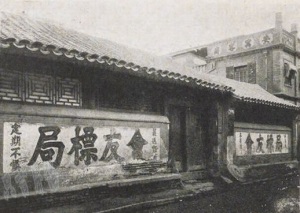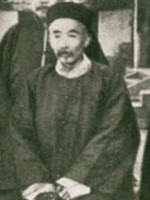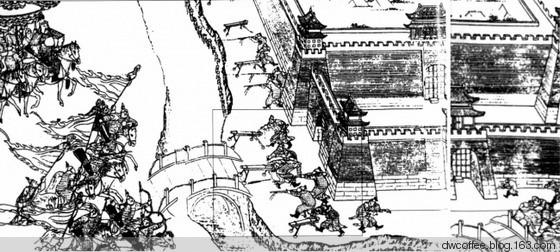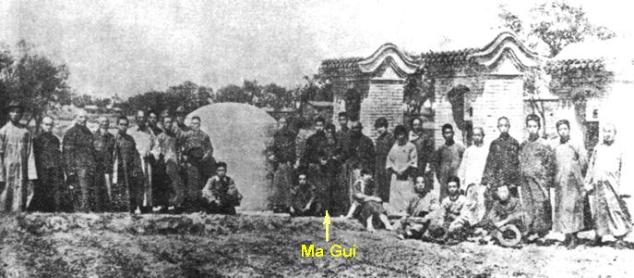In the previous post we talked about masters who taught princes and nobles. In terms of status and prestige, that is definitely the highest level a professional martial artist could aspire to.
In general, career options for martial artists – those whose focus purely on weapons and empty hand skills (vs broader studies involved in military arts), are few in traditional society. There were basically four:
1) The best, most ideal situation is one where the master has his own school. Here the students come to you. This requires the highest level of skill, as you have a known, fixed location, and anyone can come and challenge you. If you lose, by custom you have to leave and cede the school to the challenger.
2) The next level is being a teacher, but you don’t have your own school, you have to go to where the students are – you work for someone, or you teach in the military.
3) The third level is one where you have to risk your own life for protect the life or properties of private clients/masters. Examples are security company jobs, and bodyguard services. In the later scenario, normally you would be live at the household you are protecting. Here the head of security can be a prestigious position, but the rank and file are basically servants of the house. In general there is a huge fall-off in prestige between the second and third level, as people think only the desperate would risk their lives like that.
4) The lowest level is in entertainment. Whatever people say about those who risk their lives for private clients, they must have a certain level of fighting skill to make a viable living doing that. The requirement for fighting skill in performance and entertainment is much lower or non-existent.
As with the case of teachers living and teaching at houses of nobles having the highest level of prestige than others with their own school, there is a notable exception for level 3 mentioned above.
In 2006 China’s central television company (CCTV) had a really interesting documentary on development of modern banking in Shanxi province. In mid to late Qing Dynasty there was great posterity, and the population of the country doubled within a century. Commerce flourished; suddenly there were many types of people needing to securely transport currency and other valuables over long distances. The interesting part is how all of this drove the development of Xinyi/Xingyi in Shanxi.
Before the invention of modern banking, if you had a lot of money, they were stored in the form of gold or silver. When you move you would have to transport all that bulky metal, becoming a big, slow, conspicuous target.
It was in Shanxi where the depositor’s note system and interstate banking was first developed some two hundred years ago. These large banks have between 5 – 10 millions ounces of silver in circulation at any one time. They had branch location in all the major cities along important trade routes. You can take their note to any one of their branch locations and convert it to hard currency.
Now there are large silos of gold and silver where these banks branches are, hence the need for large number of high level martial artists to guard the bank and the wealthy bankers. Since this is Shanxi, it meant Xinyi/Xingyi masters. Because of the great market demand, high level Xingyi masters were paid like today’s professional athletes. No surprisingly the ranks of elite Xingyi masters and the art itself grew by leaps and bounds during that time.
In Shanxi the number one location for these banks is Taigu. There one such wealthy banking family the Chao’s (曹) employed over 500 security guards for his household alone. The martial instructors working for him included such luminaries as Li Laonong (李老农) and Che Yizhai (车毅斋).
This is also where the first government-approved private security company – Biaoju (镖局), was founded. The martial art master who founded the first Biaoju is known as Zhang Heiwu (张黑五). He was the fifth (wu 五) son of his family and had dark complexion (hei 黑). Today we don’t know exactly what martial art he studied, we just know that he was from Shangxi. According to legend he was martial art instructor to Emperor Qianlong. That it was with the emperor’s suggestion/approval that he opened the first of the “Big Ten” Biaoju’s of Qing Dynasty. He actually opened the Beijing branch first. This makes sense as most banks have locations in the capitol, and at year-end they usually ship large quantities of gold/silver home to headquarters in Shanxi.
Before the age of motion pictures, television, cable, satellite, internet, and recorded medias, everywhere people in sports and entertainment in general occupied the lowest rung in societies. But with the power of media comes astronomical increase in the earning potential, and with that the elevated status. So it is true that great masters who would otherwise have their own school or teach powerful/wealthy clients would choose the pursue the most dangerous, but now incredibly lucrative private security business.
Before the arrival of modern ships, trains, and automobiles, long distance travel was one of the mundane but highly hazardous endeavors in life. It is for this major reason these security companies exist. These security companies have 6 main lines of business: 1) mail courier service for the government (xin biao 信鏢)、2) transport of bank notes (piao biao 票鏢), 3) transport of gold/silver (yin biao 銀鏢), transport of grain as tax revenue for central government (liang biao 糧鏢), transport of goods (wu biao 物鏢), transport/safeguarding of people (ren shen biao 人身鏢).

Cart use by Biaoju
One of the most common types of customers for security agencies is retired government officials or officials at the end of a term transferring to another post. If you passed the imperial civil service exams, the government would post you wherever people are needed. So you may be thousands of miles from home town. In China there’s this very common attitude of “a leaf falls to its root” – when you retire you’re supposed to stage a triumphant return to your home town. You left town a ‘wearing plain cloth’, you return ‘wearing silk/satin’. Showing how successful you are, how you brought glory not only to your ancestors but the home town.
Of course, just like the current situation in modern China, corruption was built into the bureaucratic system. In modern program management parlance, China historically chose a ‘people-centric’ system versus a ‘process-centric’ system, believing no amount of written laws can cover all situations, that ultimately it’s up to the judgement of officials in charge. Also, there’s this idea that punishment must always be balanced by humanity (eg. when sentencing people who are stealing food because they are starving). The drawback of course of placing this much power in the hands of individuals is that this leads to ample opportunity for abuse/corruption.
Even a mid-level official would be extremely wealthy by the time his tenure ended. This is where one of the most common attempts at highway robbery took place. The local people would think “you made all your ill-gotten gains off us here, that money should rightfully stay here”. The capitol, more than anywhere else, is where these clients were.

Manual of Underworld Slangs as recorded by Pingyao Biaoju
There’s actually a lot of interesting things written about the security agency/bandit relationship. Like modern virus-protection software companies, it’s at the same time an antagonistic and symbiotic relationship. Lots of time it’s not even real outlaws as local powers. For example, something like a dock, or waterway, it’s ruled by some kind of gang. If you want passage, you have to go through them. There’s a Chinese saying “even a strong dragon cannot bully the local snake”. Imagine you’re going to a land that is completely new to you, you don’t speak their dialect, you don’t know anyone, you don’t know their unique regional culture, you don’t know the terrain. If they really wanted to, they can set a trap and get you fairly easily.
The local snakes were smart, they wouldn’t just rob every traveler, as that would just make people avoid their area all together. That’s where the semi-antagonistic element come in. You go to a new place, you need to pay respect to the local powers. If you’re new, you have to fight them. If you beat them, they’ll know having a full scale fight with your company is not a good business proposition. They’ll respect you, and let you pass through their territory. Of course you have to shower them generously with gifts each time. If you’re weak, and a nobody, then they’ll just take everything from you.
So security company doesn’t operate by trying to beat everyone who’s in their way every time. But they have to beat everyone at least one time. Diplomacy by itself is useless against uncivilized people if not backed by very real force. As the saying from the Warring States era goes “a small/weak country has no diplomacy” (they just do what strong countries tell them).
Where high level martial art is most needed is when you’re opening a route for the very first time. After that comes diplomacy, but you still need to maintain a great fighting reputation, so people won’t stop respecting you. The biggest companies, like the one operated by San Huang Paochui group, are the ones that had opened safe passages to many important areas of the country. Sort of like you’re an airline and you dominate the New York – Los Angeles route. That’s how your potential customer will know you and select you.
In Chinese the saying is “when at home[town] you rely on family, when traveling outside you rely on friends”. Obviously in the later case the more friends the better. Life on the road is unpredictable, you may run into all kinds of unforeseen problems. In the old days everything is based on relationship, so it helps to have a large network of such powerful “friends”.
The best example of successful agency is that of San Huang Pao Chui group. Song Mailun was originally a high ranking member of Shen Ji Ying (Capitol Garrison – Modern Firearm Division). The prince in charge of Shen Ji Yin was so impressed by him that Song was promoted to Class Five government official (out of 9 classes). But seeing how fruitless it is to serve the corrupt and declining government, he went private and formed Hui You (meet friends) Security Company, the largest in the capitol.

Hui You Biaoju
From his government work he became well connected politically with the political and economic elites, giving him unparalleled access to his potential client base. As a top level martial artist – a peer of, and good friends of Dong Haichuan, Liu Zhijun, and Yang Luchan, he was well connected to the martial art scene, giving him access to the talent talent needed to run his company.
His work at the security company made him intimately familiar with every type of person, profession, and associations (religions, professional guilds, gangs, outlaws, etc) in society, from the highest to the lowest. All of this gave him great knowledge and wisdom. In today’s parlance we’d call him someone who really knew how the entire system works, who can solve very difficult problems under seemingly impossible deadlines. So he was highly sought after by all kinds of people.
Because they fight in the real world all the time and employed so many martial artist, the Pao Chui group left perhaps the largest curriculum of any martial art group. Empty hand routines alone comprise of 108 sets. On top of that every type of weapon imaginable… They had a great reputation because of the constant feedback from their daily work, any weak members would’ve been weeded out very naturally, quickly.
Just as their rise was rapid and impressive, with the arrival of trains, ship, automobile, and better roads, the decline was also swift. The last of the “Big Ten” Biaoju closed its doors in 1920.
Martial art, like any human pursuit, is an organic product of its environment. When there are economic, military, social incentives, it develops and flourishes. When those needs go away or changes, the arts either decline, disappear or adapt to meet the new need. So it is that we can say the overall state of art for Xinyi/Xingyi (and most traditional Chinese martial arts) was definitely higher in year 1800 than year 1700, and better in 1900 then 1800, but in 2000 it’s definitely lower than 1900.







